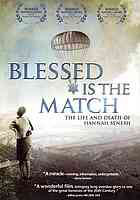
Blessed Is the Match: The Life and Death of Hannah Senesh 2008
Distributed by Women Make Movies, 462 Broadway, New York, NY 10013; 212-925-0606
Produced by Katahdin Productions; Lisa Thomas & Roberta Grossman
Directed by Roberta Grossman
DVD, color, 86 min.
Sr. High - General Adult
Jewish Studies, Holocaust Studies, World War II
Date Entered: 10/27/2011
Reviewed by Sheila Intner, Professor Emerita, Graduate School of Library & Information Science, Simmons College GSLIS at Mt. Holyoke, South Hadley, MAHannah Senesh is a modern Jewish heroine. This compelling biography, well documented with photographs, film clips, and interviews of people who knew her, portrays a determined young woman who chose to give up the relative safety of living in a kibbutz in Palestine in 1944 to fight against the Nazis’ relentless destruction of Jews in her Hungarian homeland.
A great deal of fine professional effort went into the making of this documentary. Although some scenes clearly are reenactments, they are based on the testimony of the actual participants, including Catherine Senesh, Hannah’s mother. Archival film clips of World War II bombings, Hitler’s speeches, and similar activities provide dramatic context for the story. Photographs of Hannah and her family as a child in Budapest, as a youth in Palestine, and, later, as a soldier in the Haganah, add to the visual record.
Among the interviewees are Hannah’s prison cellmates and members of the volunteer Haganah paratroop squad that she joined. Hannah did so hoping to find her mother, the last of her family in Budapest. The squad’s fatal mission was to parachute behind enemy lines to provide information for the British military, and to try to rescue Jews. Budapest’s Jews were among the last such community in Europe, protected for much of the war by a government trying to remain neutral. When the Nazis finally occupied Hungary, Jews were hurried off to the death camps even though everyone knew the Axis cause was lost.
Hannah operated with local partisans before being captured by the Nazis. At the end of the film, the elder Ms. Senesh, also imprisoned for a time, is shown in the prison office, pleading for a pass to visit her daughter. The Nazi officer for whom she waits is in the process of abandoning the nearly empty prison ahead of the advancing Russians, but executing Hannah was one of his final acts.
After the war, Hannah’s remains were eventually returned to Israel, where she was honored throughout that tiny nation, and then, reburied among her Haganah colleagues.
Narrated by Joan Allen, the documentary features commentaries by noted British historian Martin Gilbert and other Holocaust scholars. Interviews with Ms. Senesh’s mother, brother, and prison cellmates who survived World War II build the picture of a strong and courageous young woman, yet one who longed to discover love and who wrote sensitive poetry until her death.
Highly recommended.